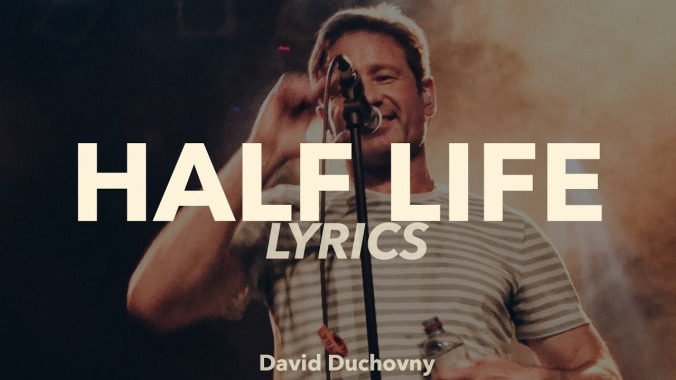We all know why this review of David Duchovny’s album exists

With few exceptions, whenever an actor decides to embark on a music career, that music will inevitably be a sort of wistful, meat-and-potatoes roots rock. It doesn’t take an imaginary degree in pop psychology to understand this. Movie stardom is a fake and fluffy business; the amount of pretense and preening involved can be downright embarrassing at times. So when actors—and this phenomenon predominantly applies to the men—decide they’d rather pick up a guitar and sing for a while, they naturally gravitate to a gritty, unadorned Americana, the kind that captures the salt-of-the-earth, dive-bar lifestyle they’ve forever opted out of.
Hence: Russell Crowe’s 30 Odd Foot Of Grunts. Kevin Bacon’s The Bacon Brothers. Kevin Costner’s Kevin Costner & Modern West. Dennis Quaid’s Dennis Quaid And The Sharks. Billy Bob Thornton and Kiefer Sutherland’s, uh, Billy Bob Thornton and Kiefer Sutherland. And so on. For dudes who spend their whole lives being pampered in makeup trailers, the dusty, rootsy side project offers a chance to put on a pair of faded blue jeans and prove that, deep down, you’re just a beer-drinking, Dylan-and-Petty-and-Cash-worshipping regular guy. And look, there’s nothing inherently wrong with that. Sure, maybe it’s just another form of play-acting, but perhaps no more so than the illusion undertaken by your own hometown’s crop of thoroughly average, yet unrealistically ambitious bar bands.
The only difference there, of course, is the wildly disproportionate attention that’s afforded them by the media and fans—fans who sometimes even buy their CDs while defensively declaring them “actually pretty good” in their five-star Amazon reviews. Or anyway, they’re not bad. They’ve definitely heard worse. And whereas most people might see some self-indulgent vanity project, well, they know the music is in his heart, and that these raspy, earnest songs are who he really is inside. When it comes down to it, this is the same transactional, illusory emotional connection that’s created by every dude who’s ever picked up an acoustic guitar. It’s just that this particular dude happens to be a millionaire on hiatus between shoots, who can afford top-flight producers and endless studio hours.
The other difference is what you’re reading right now, a review of a famous actor’s album that is designed to attract one of two audiences: 1) those aforementioned diehards, who will show up to circle the wagons and lambast the reviewer for talking about everything but the music, then call out his self-evident bitterness, failed dreams, and myriad other reasons for not objectively, critically offering it unreserved praise; and 2) those driven by a semi-morbid curiosity, perhaps looking for a quick hit of schadenfreude and the reassurance that wealthy, famous, attractive people can’t be stars at everything. In some cases, that review may even supplant other actual, in-depth articles on more talented bands whose only real demerit is that they don’t have a TV star in them. The sad, mercenary truth at play is that this is just how it works. It’s the most extreme version of why the pageviews on a music review for someone you’ve already heard of will always be 10 times that of one for a more deserving, yet unknown artist. It’s why the comments for our monthly album previews inevitably have someone sneering, “You just made all these bands up.” It’s why you clicked. It is a mutually beneficial parasitic relationship, and it’s what keeps the celebrity band ecosystem humming.
Anyway, to David Duchovny’s credit, he’s more honest about exploiting that system of privilege—and his own rock dilettantism—than most. In interviews surrounding the release of his 2015 debut, Hell Or Highwater, the actor was humbly self-effacing, admitting that, y’know, he’d really only picked up the guitar a few years ago, in the wake of his divorce from Téa Leoni. He also confessed that, hey, he knows he’s not that great of a singer, and that his music is almost completely derivative of the “classic white-guy rock” canon. It’s an ingratiating, very smart way of lowering expectations: “I’m saying here’s something I did,” Duchovny told Rolling Stone. “If you like it, take it with you. And if you don’t, maybe I’ll do it again, and hopefully you’ll like that one.” (Though, of course, at the same time, he’s saying all this to Rolling Fucking Stone. Do you have any idea how many struggling bands would kill to announce their debut album—let alone the follow-up, after that one was met with a collective shrug—in Rolling Stone?)
 Keep scrolling for more great stories.
Keep scrolling for more great stories.
